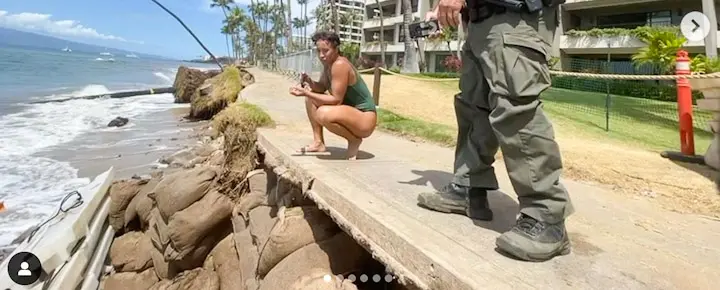Travel
Could a Legal Fight Send Hawaii Travel Prices Skyrocketing?

If Hawaii travel expenses haven’t been volatile enough, an ongoing legal battle brewing could raise airfares and other expenses for island-bound travelers. The case stems from allegations by Honolulu that oil companies knowingly contributed to climate change and could be headed to the U.S. Supreme Court.
There’s a real possibility that the costs of travel, via fuel—could rise significantly. But what does this mean for your next Hawaii vacation? That’s complex.

What’s going on with the Hawaii lawsuit?
In late 2023, the Hawaii Supreme Court told the City of Honolulu to proceed with its lawsuit against major oil companies. The claim is that these companies allegedly misled the public for decades about the environmental impact of fossil fuels. As a result, the city argues that Hawaii has suffered environmental damage from climate change, particularly rising sea levels, which could cost billions in adaptation and repairs.
Honolulu seeks financial compensation to cover these damages, but the oil companies are fighting back. They argue that any climate change regulation should fall under federal jurisdiction, not state law, and that a decision in Honolulu’s favor could lead to a messy, state-by-state patchwork of related lawsuits.
While at this point, it may seem like a legal technicality, how this case evolves could have a widespread impact, especially on the price of your next flight to Hawaii.
The relationship with razor-thin airfare profit margins.
So, how does a lawsuit affect Hawaii travel costs? Fuel accounts for 20-30% of your airline ticket and almost 30% of operating costs. If the case goes forward and Honolulu prevails, the oil companies could face massive financial penalties.
Airlines typically operate on thin profit margins, so even a small increase in fuel prices can raise ticket prices. Given Hawaii’s distance from the mainland, fuel is already a major factor in the cost of flights to the islands.
IATA recently said, “Earning just $6.14 per passenger is an indication of just how thin our profits are—barely enough for a coffee in many parts of the world.”
Mike G., a frequent visitor to Hawaii, shared his thoughts with us. “My Hawaii flights are already more expensive this year, so if fuel costs go up, I’m guessing I’ll be paying even more for travel.”
However, not everyone is convinced this lawsuit will lead to skyrocketing travel costs. There’s always talk of rising prices, but I think airlines will absorb most of the costs, said one reader, while another told us, “It’s in airlines’ best interest to keep flights affordable and Hawaii visitors coming.”
How Hawaii visitors can prepare.
While we await the courts’ decisions on the future of this case, we can all keep this in mind when planning future travel to Hawaii.
If there’s an odd light at the end of the tunnel, it’s this. If fuel prices rise, there are still ways to minimize the impact on your travel budget. And with the soaring costs of accommodations, Hawaii airfares have taken a back seat to the cost of hotels.
First, consider booking flights earlier than you might otherwise.
Flight prices are increasing more than normal as the departure date approaches, and with the potential for rising fuel costs, locking in a price now could save money later.
Many readers have confirmed a valuable tip for budget-conscious travelers, which is using flight price tracking apps to find the best deals. You’d be surprised how much you can save if you’re flexible with your dates. BOH uses Google Flights for that.
Another tip is to stay flexible with your travel dates. Mid-week flights are often cheaper than weekend departures, although not always, and avoiding peak seasons can help you find better Hawaii airfare deals.
While the impact of rising fuel costs can’t be entirely avoided, savvy travelers can still find ways to make their dream vacation to Hawaii somewhat more affordable.
Could this case go to the U.S. Supreme Court?
It’s uncertain whether the U.S. Supreme Court will take up the case. In June 2024, the Court asked the Solicitor General for input. The oil companies argue that federal law, particularly the Clean Air Act, preempts state-level lawsuits like Honolulu’s. If the case reaches the Supreme Court, it could set a precedent that limits the ability of states to hold corporations accountable for such issues.
This case raises a big question about federal vs. state authority. And therein lies much uncertainty. If the City of Honolulu is allowed to proceed, the legal landscape could shift dramatically, potentially leading to higher airfare costs to Hawaii and across the nation.
The bigger picture for Hawaii’s future.
Beyond the immediate impact on travel costs, this lawsuit highlights some of the broader challenges Hawaii faces as rising sea levels and other climate changes continue to affect the islands. Without a doubt, the costs of adaptation will likely grow in the years ahead.
While travelers might feel the impact of higher prices in the short term, Hawaii’s long-term sustainability is on the other side of the token. Start with coastal erosion and sea level rise, the state must find ways to balance our tourism industry with the need to protect the natural environment. The sea level at Hilo has risen about 10 inches since 1950. That pace is said to have accelerated over the past decade and is now increasing by an inch every four years. Hawaii is a beautiful place, but clearly it’s also fragile.
Final thoughts: what should Hawaii travelers do?
For now, it’s simply about staying informed and being prepared. If you’re planning a trip to Hawaii, keep an eye on airfare trends and consider booking sooner rather than later.
The outcome and time frame of this lawsuit are still uncertain. While no one wants to pay more for a Hawaii vacation, the potential for rising fuel costs is very real.
We welcome your comments!









